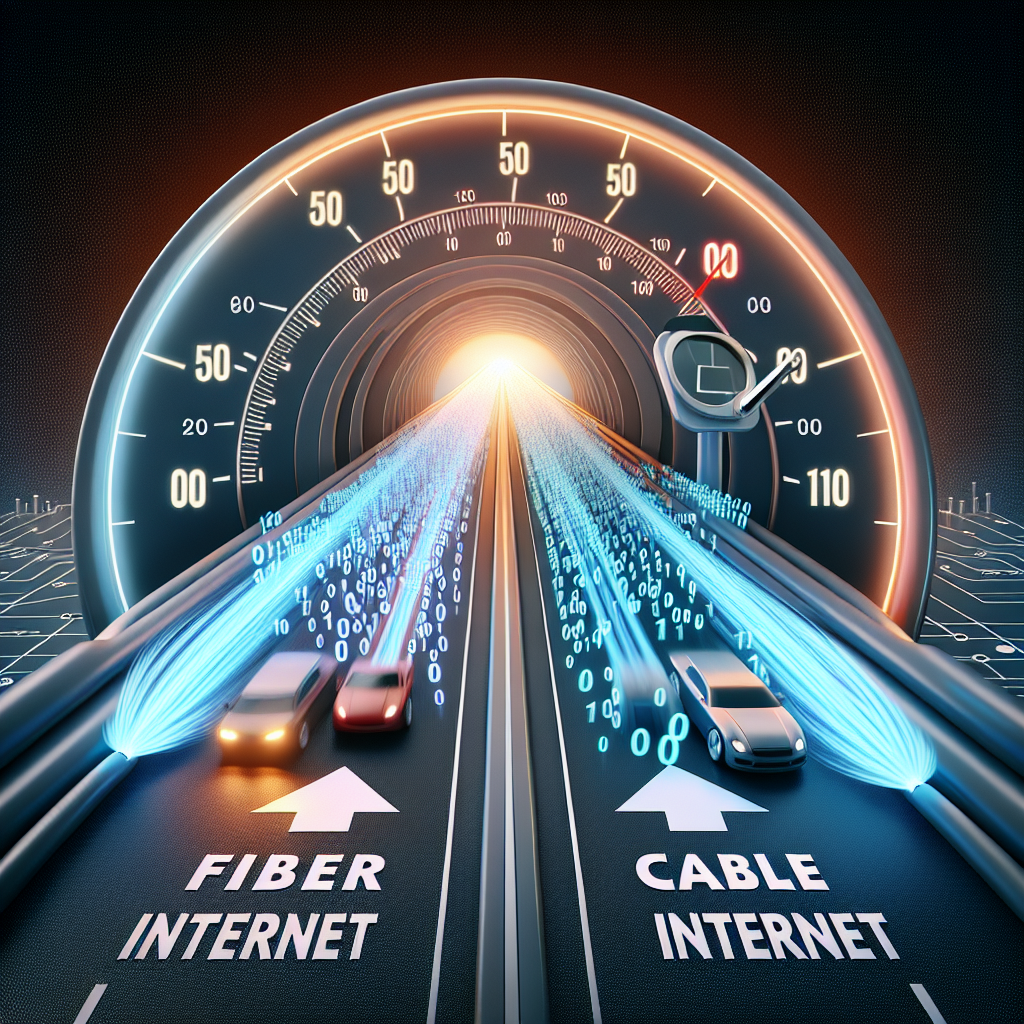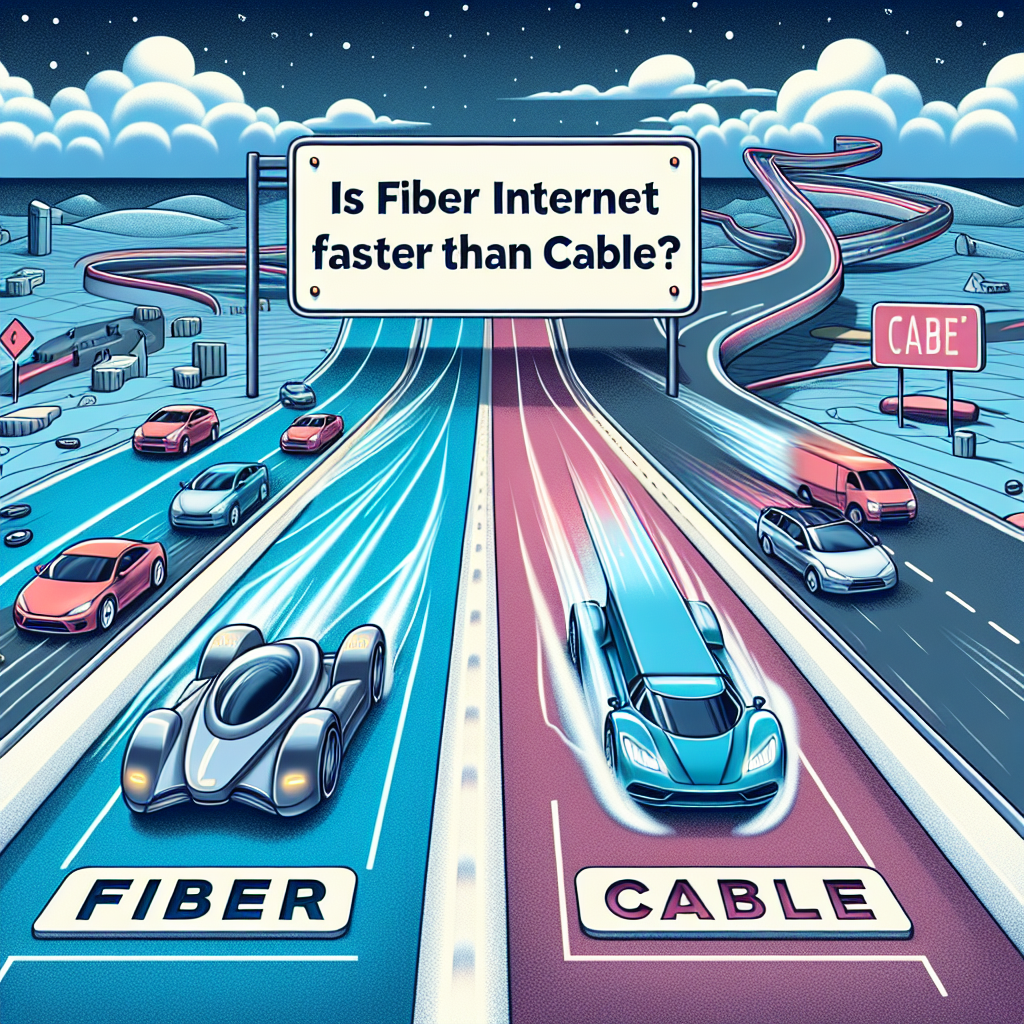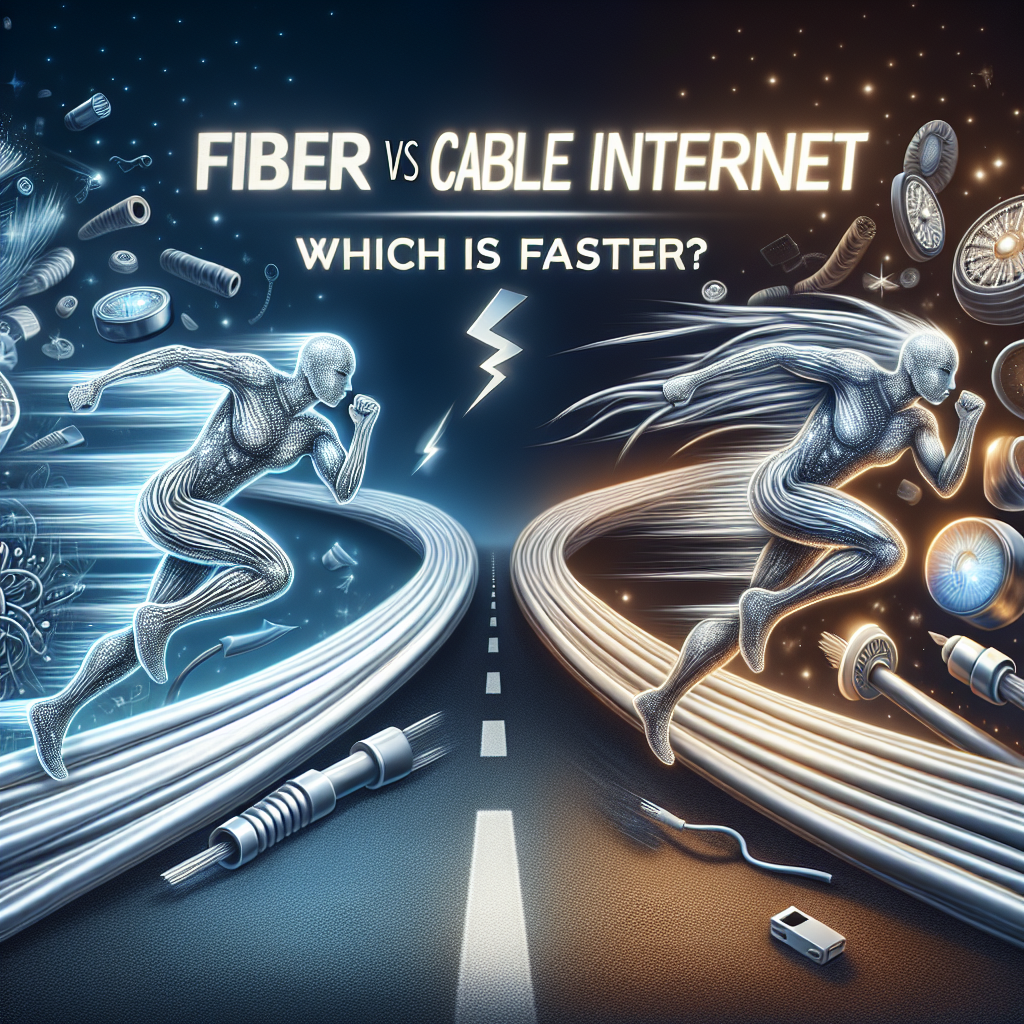In the ever-evolving world of technology, the battle between fiber internet and cable reigns supreme. Many users swear by the lightning-fast speeds of fiber internet, while others argue that cable can hold its own in the speed department. So, which is truly faster? In this exploration of internet speeds, we will delve into the nitty-gritty details of fiber internet versus cable. From download and upload speeds to latency and reliability, we will uncover the truth behind these internet giants. Join us on this journey to discover whether fiber internet is really the ultimate speed champion or if cable still has a fighting chance in the speed race.
Yes, fiber internet is typically faster than cable internet. Fiber optic cables are capable of transmitting data at much higher speeds than traditional coaxial cables used for cable internet. This is due to the fact that fiber optics transmit data using light signals, which can travel much faster than the electrical signals used by cable internet. Additionally, fiber internet is not affected by factors such as distance from the provider or interference, making it a more reliable and consistent option for high-speed internet access.
Understanding Fiber Internet and Cable Internet

Definition of Fiber Internet
Fiber internet is a type of broadband connection that utilizes fiber-optic cables made of thin glass or plastic strands to transmit data using light signals. These cables are designed to carry data at incredibly high speeds, making fiber internet one of the fastest and most reliable internet options available to consumers. Fiber-optic technology allows for symmetrical speeds, meaning that both download and upload speeds are consistent and fast. This results in smoother online experiences, especially for activities that require a lot of bandwidth, such as video streaming, online gaming, and video conferencing.
Definition of Cable Internet
Cable internet, on the other hand, relies on coaxial cables to deliver internet service to users’ homes. These cables are typically shared among multiple users in a neighborhood, which can sometimes lead to congestion and slower speeds during peak usage times. While cable internet can provide fast download speeds, upload speeds tend to be slower in comparison to fiber internet. Cable internet is known for its widespread availability and is a popular choice for many households due to its relatively fast connection speeds and bundling options with television services. However, it may not always offer the same level of speed and reliability as fiber internet.
Key Differences Between Fiber and Cable Internet
- Infrastructure Variations
Fiber internet utilizes optical fibers made of glass or plastic to transmit data using light signals. These fibers are thin and flexible, allowing data to travel at the speed of light with minimal interference. On the other hand, cable internet relies on coaxial cables, which are made of copper and aluminum. These cables are thicker and less efficient in transmitting data compared to fiber optics.
- Bandwidth Capacity
Fiber internet has a significantly higher bandwidth capacity than cable internet. This means that fiber optic cables can accommodate more data at faster speeds without experiencing congestion or slowdowns. Cable internet, while capable of providing decent speeds, may struggle to keep up with the demands of multiple devices or data-intensive activities due to its limited bandwidth capacity.
- Signal Transmission
In terms of signal transmission, fiber internet excels due to its use of light signals. These signals do not degrade over long distances, resulting in consistent and reliable internet speeds regardless of the distance from the provider’s network. Cable internet, on the other hand, can experience signal loss and interference, especially over extended cable lengths, leading to slower speeds and potential connection issues.

Speed Performance of Fiber Internet
Fiber internet is renowned for its exceptional speed performance, often surpassing traditional cable internet in various aspects. The technology behind fiber optics allows for faster and more reliable data transmission, leading to significant speed advantages.
Factors Affecting Fiber Internet Speed
- Infrastructure: Fiber optic cables are made of glass or plastic and use light to transmit data. This allows for faster speeds compared to copper cables used in cable internet.
- Bandwidth: Fiber internet typically offers higher bandwidth capacity, allowing for more data to be transmitted simultaneously without compromising speed.
- Distance: Fiber optic cables can transmit data over longer distances with minimal signal loss, resulting in consistent high speeds regardless of proximity to the provider.
Real-world Speed Tests
- In various speed tests conducted by independent organizations, fiber internet consistently outperforms cable internet in terms of download and upload speeds.
- Fiber internet users often experience lower latency and higher consistency in speed, making it ideal for activities such as online gaming, video streaming, and video conferencing.
Benefits of Fiber Internet Speed
- Enhanced User Experience: The faster speeds of fiber internet lead to quicker loading times, smoother streaming, and seamless connectivity for multiple devices.
- Future-Proofing: As technology advances and data demands increase, fiber internet’s superior speed capabilities position it as a future-proof option for consumers seeking long-term reliability and performance.
Debunking Fiber Internet Speed Myths
In the realm of internet connectivity, fiber internet has garnered a reputation for being significantly faster than traditional cable connections. However, there exist several myths surrounding the speed performance of fiber internet that warrant clarification to provide a more accurate understanding of its capabilities:
- Myth: Fiber internet speed is always faster than cable
- Contrary to popular belief, the speed of fiber internet is not solely determined by the type of connection. While fiber optic cables have the potential to offer faster speeds due to their ability to transmit data using light signals, other factors such as the quality of infrastructure, network congestion, and the user’s subscription plan can also influence internet speeds.
- Myth: Fiber internet guarantees consistent high speeds at all times
- While fiber internet is known for providing reliable speeds, it does not guarantee a flawless experience under all circumstances. External factors like maintenance work, outages, or technical issues can still impact the speed and performance of fiber internet connections, highlighting the importance of a robust infrastructure and proactive maintenance measures.
- Myth: Upgrading to fiber internet guarantees a dramatic speed improvement
- While upgrading from cable to fiber internet can lead to a noticeable speed enhancement in many cases, the extent of the improvement may vary depending on individual circumstances. Factors such as the distance from the provider’s network, the quality of the equipment, and the overall network capacity can affect the actual speed increase experienced by users.

By debunking these common myths surrounding fiber internet speed, it becomes evident that while fiber optic technology offers significant advantages in terms of speed and reliability, various factors can still impact the actual internet speeds experienced by users. Understanding the nuances of fiber internet performance is essential for making informed decisions regarding internet connectivity and managing expectations regarding speed capabilities.
Speed Performance of Cable Internet
When it comes to the speed performance of cable internet, there are several key factors to consider.
Factors Affecting Cable Internet Speed
- Shared Bandwidth: Cable internet operates on a shared network, meaning that the more users there are in a specific area, the more the bandwidth is divided among them. This can lead to slower speeds during peak usage times.
- Distance from Provider: The physical distance between a user’s location and the cable provider’s central hub can impact internet speeds. Longer distances can result in signal degradation and slower connections.
- Network Congestion: High levels of network congestion, particularly in densely populated areas, can cause delays and slower speeds for cable internet users.
In real-world speed tests, cable internet often delivers speeds that are advertised by service providers. However, these speeds can vary based on the factors mentioned above. Users may experience fluctuations in speed throughout the day, depending on network traffic and other external factors.
Limitations of Cable Internet Speed
Despite offering relatively fast speeds, cable internet does have its limitations. The shared nature of the network can lead to inconsistent performance, especially during peak hours. Additionally, the distance from the provider and network congestion can further impact the overall speed and reliability of cable internet connections.
Comparing Fiber and Cable Internet Speeds
When comparing Fiber and Cable internet speeds, several key factors come into play that can significantly impact the overall performance and user experience. Here is a detailed breakdown of how these two types of connections stack up against each other:
- Bandwidth Capacity: Fiber internet typically offers higher bandwidth capacity compared to traditional Cable internet. This means that Fiber connections can handle larger amounts of data at faster speeds, making them ideal for activities that require high data transfer rates, such as HD video streaming, online gaming, and large file downloads.
- Upload and Download Speeds: Fiber internet excels in providing symmetrical upload and download speeds, meaning that users can send and receive data at the same high speeds. On the other hand, Cable internet often exhibits asymmetrical speeds, with slower upload rates compared to downloads. This can impact tasks like video conferencing, cloud storage, and uploading content to the web.
- Latency and Ping Times: Fiber internet offers lower latency and ping times compared to Cable internet. Lower latency results in quicker response times when loading web pages, playing online games, or streaming content. This can lead to a smoother and more seamless online experience for Fiber internet users.
- Reliability and Consistency: Fiber internet is known for its reliability and consistency in delivering advertised speeds, regardless of peak usage hours or network congestion. Cable internet, on the other hand, may experience slowdowns during peak times when many users are online simultaneously. This difference in performance can impact activities like video streaming in high definition or online gaming, where a stable connection is crucial.
In conclusion, while both Fiber and Cable internet have their strengths and weaknesses, Fiber internet generally emerges as the faster and more reliable option when it comes to speed performance. Its higher bandwidth capacity, symmetrical upload and download speeds, lower latency, and consistent performance make it a preferred choice for users who prioritize fast and stable internet connections for their online activities.
The Future of Internet Connectivity
As technology continues to advance rapidly in the realm of internet connectivity, the debate between fiber internet and cable internet speeds intensifies. Here, we delve into the latest developments and potential future trajectories of these two primary modes of internet transmission.
Technological Advancements in Fiber Internet
- Fiber Optic Infrastructure Upgrades: Fiber internet, known for its high-speed data transmission capabilities, is poised for further enhancements through the installation of more advanced fiber optic cables. These cables are designed to carry data using light signals, resulting in faster and more reliable internet connections.
- Symmetrical Speeds: One of the key advantages of fiber internet is its ability to offer symmetrical upload and download speeds. With advancements in fiber technology, we can expect even greater symmetrical speeds, providing users with a seamless online experience for activities such as video conferencing, cloud computing, and online gaming.
- Increased Bandwidth Capacity: The future of fiber internet may also see significant improvements in bandwidth capacity, allowing for the smooth transmission of large amounts of data at incredibly high speeds. This enhanced capacity can support emerging technologies like virtual reality, augmented reality, and the Internet of Things (IoT).
Potential Improvements in Cable Internet
- DOCSIS 4.0 Standard: Cable internet providers are exploring upgrades to the Data Over Cable Service Interface Specification (DOCSIS) standard to enhance internet speeds. The latest iteration, DOCSIS 4.0, promises to deliver gigabit speeds over existing cable infrastructure, potentially narrowing the speed gap between cable and fiber internet.
- Full Duplex DOCSIS: Another innovation on the horizon for cable internet is Full Duplex DOCSIS technology, which enables simultaneous data transmission in both upstream and downstream directions. By implementing this technology, cable internet providers aim to boost speeds and improve overall network performance.
- Integration of Fiber Optics: Some cable internet providers are integrating fiber optic technology into their networks to increase speed and reliability. By leveraging a hybrid fiber-coaxial (HFC) infrastructure, cable companies can deliver faster internet speeds while utilizing existing coaxial cables in conjunction with fiber optics.
Impact on User Experience
- Seamless Connectivity: The ongoing advancements in fiber and cable internet technologies are set to revolutionize the way users experience online connectivity. Faster internet speeds, lower latency, and greater reliability will enable users to stream high-definition content, engage in real-time communication, and access cloud-based services with minimal interruptions.
- Future-Proofing Networks: By investing in the development of faster internet infrastructure, both cable and fiber internet providers are positioning themselves to meet the evolving needs of users in an increasingly digital world. The enhanced speed and performance capabilities of these networks will cater to the growing demand for high-bandwidth applications and services, ensuring a seamless online experience for consumers.
Considerations for Choosing Between Fiber and Cable Internet
When deciding between fiber and cable internet, there are several key considerations that users should take into account to ensure they are selecting the most suitable option for their needs:
- User Needs and Preferences: One of the primary factors to consider when choosing between fiber and cable internet is the specific requirements and preferences of the user. Fiber internet is known for its faster and more reliable speeds, making it ideal for users who require high bandwidth for activities such as online gaming, streaming high-definition content, or working from home. On the other hand, cable internet can offer sufficient speeds for basic browsing and streaming needs at a potentially lower cost, making it a more budget-friendly option for users with less demanding internet usage.
- Availability and Accessibility: Another crucial factor to consider is the availability and accessibility of fiber and cable internet in the user’s area. While fiber internet is known for its superior speeds, it is not as widely available as cable internet, which has a more extensive network infrastructure in place across many regions. Users should check with their local internet service providers to determine which type of internet connection is available in their area and weigh this factor when making their decision.
- Long-term Benefits: When comparing fiber and cable internet, it is essential to consider the long-term benefits of each option. Fiber internet is considered a more future-proof choice due to its ability to support higher speeds and bandwidth capacity compared to cable internet. Investing in fiber internet may provide users with a more reliable and efficient internet connection that can accommodate evolving technology and increasing internet usage demands. While the initial costs of fiber internet may be higher than cable internet, the long-term benefits of faster speeds and improved performance may outweigh the upfront investment for users seeking a high-quality internet experience.
FAQs for “Is Fiber Internet Really Faster Than Cable? Exploring the Truth Behind Internet Speeds”
Is fiber internet really faster than cable?
Yes, in general, fiber internet is faster than cable internet. Fiber optics technology allows for faster data transmission speeds compared to traditional cable lines, resulting in quicker upload and download times. Fiber internet is capable of providing more consistent and reliable speeds, especially during peak usage times.
Are there any instances where cable internet might be faster than fiber?
Although fiber internet is generally faster, there are some scenarios where cable internet might be able to provide faster speeds. This can happen if the fiber internet service is not optimized or if the cable internet provider has recently upgraded their infrastructure. Additionally, cable internet may be faster in certain geographical locations where fiber optic cables have not been installed.
What are the other advantages of fiber internet, besides speed?
Apart from speed, fiber internet offers other benefits such as lower latency and better reliability. Fiber optic cables are less susceptible to interference and signal degradation over long distances, resulting in a more stable connection. Fiber internet also has higher bandwidth capacity, allowing for multiple devices to be connected to the network without experiencing a decrease in speed.
Is fiber internet more expensive than cable internet?
Generally, fiber internet is more expensive than cable internet due to the higher cost of installation and maintenance of fiber optic infrastructure. However, the price difference may vary depending on the service provider and the specific location. It’s important to compare prices and consider the long-term benefits of fiber internet before making a decision.
